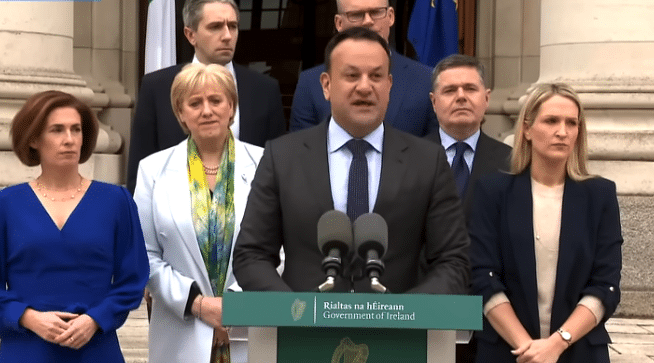It takes a lot for a world leader to step down before they go to the polls or are officially required to leave.
Even recent history is littered with examples of leaders doing the opposite. Particularly men who have pursued every measure possible to hold on, despite their presence at the top becoming toxic. Just look to Russian President Vladamir Putin’s landslide election “win” over the weekend, giving him another six years in office after serving as either PM or president of Russia since 1999.
But in Ireland, Prime Minister Leo Varadkar has declared he is actually now not the best person for the job, announcing his surprise resignation overnight, after two terms in office.
Varadkar follows some rare other recent examples including former New Zealand prime minister Jacinda Ardern, who said she didn’t have enough “left in the tank” to take her party to the 2023 election. She too could see that there would be someone better for the job.
In the current, dangerous geopolitical climate dominated by “strongman” leaders who will seemingly stop at nothing to retain power, including Putin, Benjamin Netanyahu in Israel, and Donald Trump pushing for reelection as president in the United States, Varadjar’s decision demonstrates the power and benefit of the “softer” approach.
Varadjar declared during his emotional speech that another prime minister would be “better placed” to take his party to the next election, to be held no later than March 2025.
“I believe a new taoiseach will be better placed than me to achieve that – to renew and strengthen the top team, to refocus our message and policies, and to drive implementation,” he said.
“After seven years in office, I am no longer the best person for that job.”
Varadjar not only stands out as an outlier on the global stage thanks to his ability to step down, but also in the way he stepped up in the first place.
Still just 45, Varadjar’s youth is notable, with him first taking the helm in his late thirties. He is the son of an Indian immigrant father and Irish mother. He was a medical doctor before going into politics. He is openly gay, sharing his sexuality publicly on an Irish radio station in 2015, when he was serving as the country’s health minister. He said that he is not defined by his mixed-race heritage, or his sexuality, or even the fact he is a doctor politician. Rather, it’s all “part of my character”.
It’s no secret that Varadkar’s party is currently struggling in the polls and reeling after a difficult referendum defeat just a couple of weeks ago.
Varadkar had led the ‘Yes’ campaign in the country-wide vote on modernising how family and women are referenced in the constitution.
The referendum included two questions. The first was about widening the definition of a family. The second question was to delete the clause that “mothers shall not be obliged by economic necessity to engage in labour to the neglect of their duties in their home” and replace it with gender-free and more inclusive language about the role of care.
Both changes were defeated — a loss that was further humiliating by the fact the vote had intentionally been scheduled to occur on International Women’s Day.
Varadkar steps down having shouldered this heavy loss, conceding that he “got it wrong”. His party, Fine Gael, has significant work ahead rebuilding itself.
But the fact Varadkar has stepped out of the way to help this happen will be an important marker of his legacy. And one we’d all be better off to see other world leaders take inspiration from.
When the time comes, there is dignity and success in moving on.
While Varadkar may not have been able to garner enough support for the rewriting of the constitution to remove sexist language about women. He takes credit for a number of other important achievements, including overseeing the abortion law reform in 2018.
He shared a list of achievents his government has made during his resignation press conference, but also powerfully conceded that his government hasn’t been successful on everything.
Most importantly, he followed through with a commitment to move on.
“When I became leader in June 2017 I knew that one part of leadership is knowing when the time had come to pass the baton to someone else — and then having the courage to do it. That time is now.”
He said there will be much speculation regarding the “quote, unquote, real reasons for my decision” but said there are not other reasons and that he currently has nothing else lined up. He looks forward to having time to think about what he will do next.
“Politicians are human beings. We have our limitations. We give it everything until we can’t anymore, and then we have to move on,” he said.


